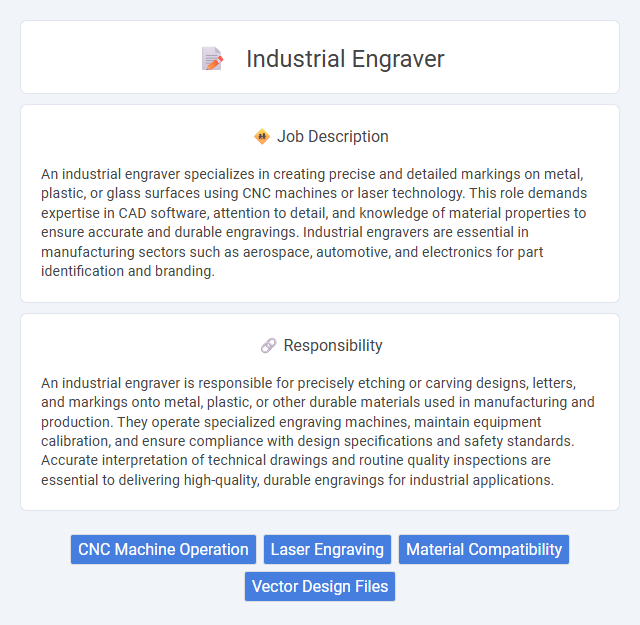
An industrial engraver specializes in creating precise and detailed markings on metal, plastic, or glass surfaces using CNC machines or laser technology. This role demands expertise in CAD software, attention to detail, and knowledge of material properties to ensure accurate and durable engravings. Industrial engravers are essential in manufacturing sectors such as aerospace, automotive, and electronics for part identification and branding.
Industrial engraver jobs often require individuals with strong attention to detail and steady hand-eye coordination, suggesting that people who thrive in precise, repetitive tasks may be well-suited for this role. Those who prefer dynamic environments or have difficulty maintaining focus for extended periods might find the job challenging or less compatible. Candidates with a keen interest in technical craftsmanship and who can tolerate physically demanding conditions are likely to have a higher probability of success in this position.
Qualification
Industrial engraver jobs require proficiency in operating CNC machines and laser engraving equipment, along with a strong understanding of CAD software for precise design execution. Candidates must possess technical skills in metallurgy and fabrication processes, coupled with the ability to interpret complex blueprints and schematics. A high school diploma or equivalent is essential, while vocational training or certifications in machining or engraving technology significantly enhance employability.
Responsibility
An industrial engraver is responsible for precisely etching or carving designs, letters, and markings onto metal, plastic, or other durable materials used in manufacturing and production. They operate specialized engraving machines, maintain equipment calibration, and ensure compliance with design specifications and safety standards. Accurate interpretation of technical drawings and routine quality inspections are essential to delivering high-quality, durable engravings for industrial applications.
Benefit
An industrial engraver job likely offers benefits such as skill development in precision machining and familiarity with advanced engraving technologies. Employment in this role may provide opportunities for career growth within manufacturing and customization industries. Workers could also experience stable income and possible access to health and retirement benefits depending on the employer.
Challenge
An industrial engraver likely faces significant challenges related to precision and attention to detail, as errors can lead to costly material waste. Meeting tight production deadlines could also add pressure, requiring efficient time management and adaptability. Handling complex machinery and staying updated with technological advancements might prove demanding but essential for maintaining quality and competitiveness.
Career Advancement
Industrial engravers develop specialized skills in precision marking and customization of materials, which opens pathways to advanced roles like production supervisor or quality control specialist. Mastery of computer-aided design (CAD) and laser engraving technology enhances employability and promotion potential in manufacturing sectors. Continuous training and certification in new engraving techniques lead to leadership positions and increased earning prospects.
Key Terms
CNC Machine Operation
Industrial engravers specializing in CNC machine operation utilize advanced computer numerical control technology to produce precise and intricate designs on metal, plastic, and other materials. Proficiency in reading CAD files, setting up CNC machines, and troubleshooting mechanical issues ensures high-quality engraving and consistent production output. Mastery of programming languages like G-code and experience with machine calibration significantly enhance the efficiency and accuracy of industrial engraving processes.
Laser Engraving
Industrial engravers specializing in laser engraving utilize high-precision laser technology to etch detailed designs, serial numbers, and logos onto metals, plastics, and other industrial materials. This process ensures durability and accuracy, crucial for traceability and branding across automotive, aerospace, and electronics industries. Expertise in CAD software and laser parameter adjustments is essential for optimizing engraving quality and maintaining production efficiency.
Material Compatibility
Industrial engravers require precise knowledge of material compatibility to ensure optimal performance and longevity of the engraved products. Common materials include metals like aluminum, stainless steel, and brass, as well as plastics such as acrylic and polycarbonate, each demanding specific engraving techniques and tool settings. Understanding the hardness, thickness, and surface texture of these materials is crucial for selecting the appropriate engraving depth, speed, and tool type to achieve high-quality, durable engravings.
Vector Design Files
Industrial engravers specialize in creating precise vector design files that serve as blueprints for automated engraving machines. Mastery of software like CorelDRAW and Adobe Illustrator is essential for converting complex artwork into scalable, high-resolution vector paths suitable for various materials. These vector files optimize accuracy and efficiency, ensuring consistent replication of intricate industrial markings and labels.
 kuljobs.com
kuljobs.com